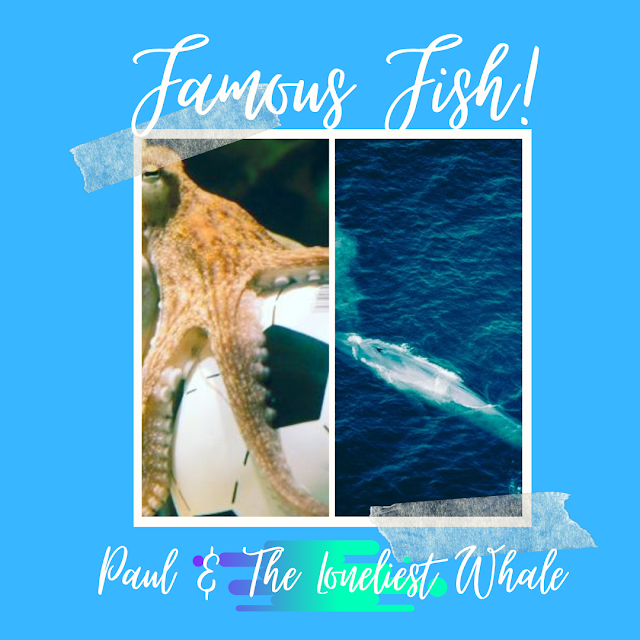Marine Creature of the Month Aug '20
Guys. Guys! We have another draw! So prepare to wrap your noodles around two more famous fish. Although, once again, not really fish.
Paul the Octopus and The Loneliest Whale
Paul is a common octopus and the Loneliest Whale is believed to be a hybrid of whales. Paul shot to fame in 2010 after accurately predicting the World Cup results, all the way to the final, while we have been picking up the Loneliest Whale's odd frequency since the eighties.
A LITTLE ABOUT PAUL...
Our footie mad octopus belongs to the species octopus vulgaris and hatched in 2008 at the Weymouth Sea Life Centre. He only lived for two years, but rocketed to fame during the 2010 World Cup with his predictions. At the time, he was living in a German Sea Life Centre and his predictions were made with the help of his handlers. They placed two baited boxes in his tank, bearing the flags of countries set to play one another, and waited for Paul to pick his preference! Out of the 14 games, he correctly predicted 12 of them - that's a 87.5% accuracy rate!
I knew octopuses were intelligent, but who knew they could predict the future?!
His two and a half year life span is typical of the species but, unlike most octopuses, Paul has left behind a legacy. He has been honoured and immortalised in pop culture, represented in Google Doodles, to apps, to Chinese thriller films which put him at the centre of a worldwide conspiracy.
The common octopus is a wide spread species with no conservation concerns. It is a widely studied species as it can be found across the world. They eat crustaceans and bivalve molluscs, usually hunting in the dusk. Having said that, octopuses are not fussy eaters and will eat anything they can wrap their tentacles around. Their mantles grow to be about 25cm long, with their tentacles reaching up to 1m. The common octopus is a master of disguise, being able to camouflage and change its colour at will.
A LITTLE ABOUT THE LONELIEST WHALE...
The Loneliest Whale is a little more difficult to define, because no one truly knows what species it is. Or even what gender! All that is known, is that it is the only one. So what makes this whale so unique? It sings at a different frequency to any other whale species alive today, at 52 hertz. This is why it is often referred to as the 52 hertz whale. This is well out of the range of other whale species; blue whales sing at 10-39Hz and fin whales sing at 20Hz. I mention these two whales in particular, because it is theorised our lonely whale is a cross-breed of these two whales.
Singing at such a different frequency means that no other whales can communicate with it. There is a strong theory that the whale may even be deaf. Since its discovery, scientists have been keeping a close eye on our mysterious friend. Or rather, a close ear, as they track it through its song. While they cannot confirm any details of its make up, gender, or why it sings at such a different frequency; it has been confirmed that it is the only whale of its kind.
Hence, loneliest whale.
It bears resemblance to fin and blue whales in both appearance and migration patterns, picking up characteristics from both species. But despite its interesting mix of migration patterns and timings, nor its unique call, our lonely friend does not seem unable to survive. There has been evidence of it maturing, with its frequency dipping to 50Hz since 1992. Its mere presence suggests it is healthy. Just, the only one.
Anyone else have Aimee Mann's One is the Loneliest Number in their heads now?
FUN FACTS
- Paul the Octopus was named after the German poem, Der Tintenfisch Paul Oktopus.
- Like his octopus brethren, Paul had three hearts.
- Paul belonged to a protected species, having achieved that status thanks to their high intelligence.
- The Loneliest Whale's calls were first picked up in 1989.
- It has been heard every year since 2014.
- Thanks to the Cold War, the original recordings of the 52Hz whale were classified. In 1992, they were partially released and scientific bodies could look for it properly.
Listening to: Final Fantasy Piano








Comments
Post a Comment